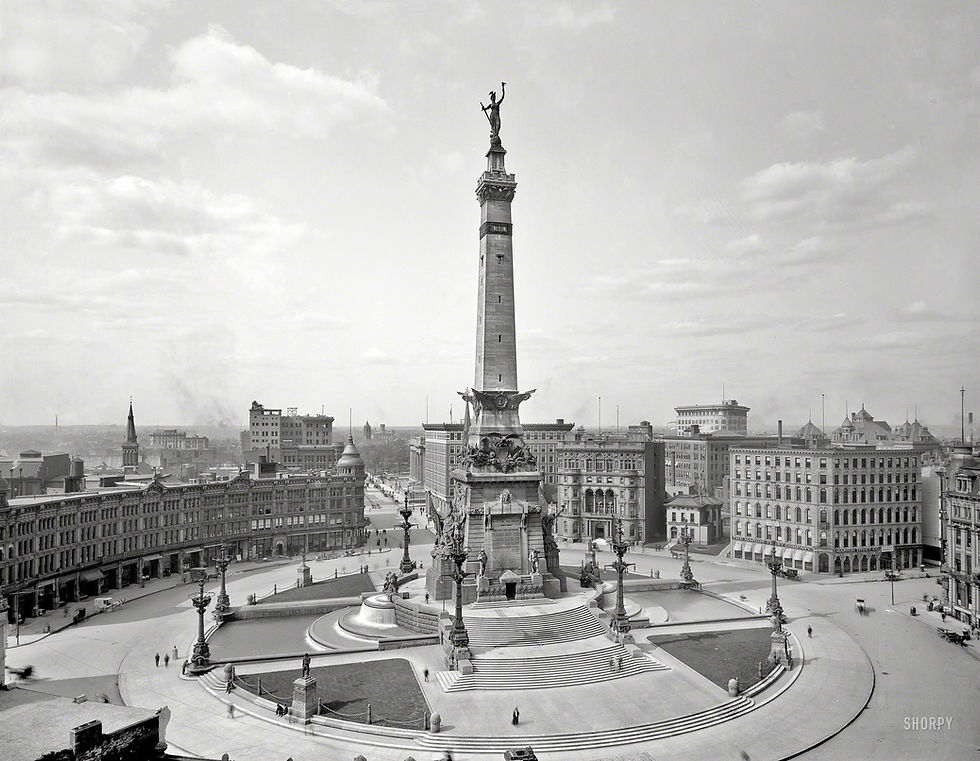Streight Up: An Indianapolis Woman, War and Spirits
- Sampson Levingston
- Mar 12, 2019
- 3 min read
Updated: May 22, 2020
INDIANAPOLIS, INDIANA - This city is absolutely filled with war monuments, none being more iconic or significant than the Soldiers and Sailors Monument that stands tall right at the center of our capitol. Our Soldiers and Sailors Monument was built over a 13 year period starting in 1888.

The monument's original purpose was to honor Hoosiers who were veterans of the American Civil War. However now it also honors veterans of the American Revolutionary War, the War of 1812, the Mexican–American War, and the Spanish–American War. It's said to be the first monument in America dedicated to the common soldier. Lady Victory faces south, looking directly at the losers of America's Civil War.
---
On December 12th of 1861, Indianapolis resident Abel Streight was named commander of the 51st Indiana Regiment. As Abel marched through Confederate territory, his wife, Lovina marched with him and the other troops.
Indiana Historical Society - Lovina McCarthy Streight, born 1830 in Steuben County, New York, accompanied her husband and 75,000 Union army troops on a march from Stevenson, Alabama to Nashville, Tennessee. She witnessed several battles, and nursed the sick and dying on the battlefield and in field hospitals.
Lovina was captured by the Confederacy on three separate occasions, and once made a daring escape using six pistols that were hidden beneath her clothing. Lovina would go on to be known as the "Mother of the 51st Infantry".
Abel's war experience was quite interesting. He was once captured and a prisoner of war, he and his men escaped by tunneling their way out. He's known most for "Streight's Raid", which ended up being an unsuccessful raid of a Confederate factories and railroads. This poorly executed raid is still celebrated in the South today.
Abel Streight would get involved in Indiana politics, becoming a senator and then running for Governor (losing) in 1880. After his death, Lovina had Abel buried in the front yard of their home located at 4121 East Washington Street.

Streight Family Home - was located on the Old National Road (Washington Street) between Indianapolis and Irvington. This home no longer stands.
Indiana Historical Society - Lovina Streight died 5 June 1910, and was buried at Crown Hill Cemetery with full military honors. Five thousand people attended her funeral, including sixty-four survivors of the Fifty-first Indiana Volunteers. Abel Streight’s body was exhumed from the front lawn of the family home, and buried beside his wife.
Each year until her death, veterans from Indiana's 51st and other Civil War vets would have reunions at her home. When she passed, her will had designated tens of thousands of dollars to go to charitable causes, such as a cemetery for veterans, a home for older women, orphanage homes, and more. Relatives of Streight wanted the money to go directly to them instead.
Historic Indianapolis - In April 1911, Lovina’s will went on trial in Marion County Court. The dead woman’s generosity stood threatened to be tripped up by accusations that she was “eccentric,” “mentally unsound,” and even “half-witted,” said the papers.
The courts ended up giving the money to Streight's family as the judge was led to believe (through dozens of testimony) that Lovina had in fact been talking to "spirits". This is the part of the story where I don't really know what to think. The excerpt that I pulled from the Historic Indianapolis blog above touched on this aspect in much more detail: LINK
What's most fascinating about the Streight's 51st Indiana Regiment is that they were volunteer soldiers. They sacrificed their time, money, family, and some sacrificed their life, to go and preserve the Union.
The goal in life should be to find something worth fighting for, and when you do.... you have to be fully prepared to fight. No matter the circumstances. Even if that means marching though Tennessee with pistols in your pants. I'm proud to say I'm still looking for my fight.
---
%20(2).png)
















Comments